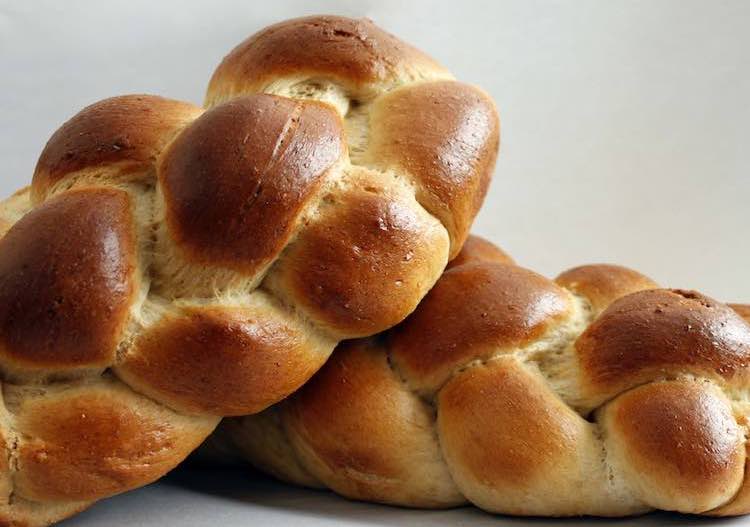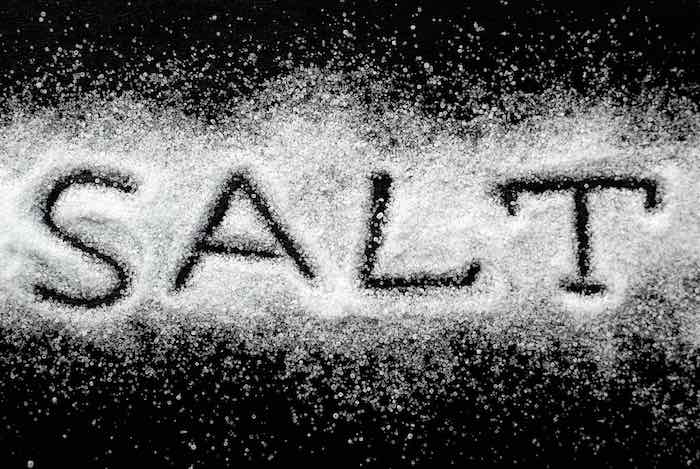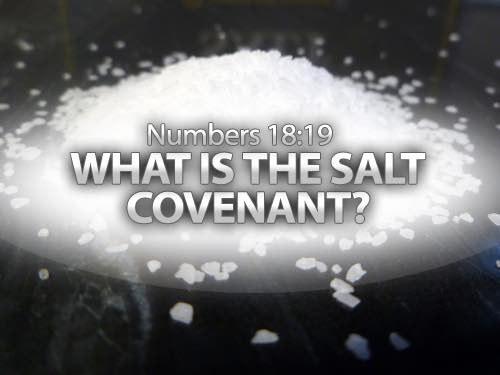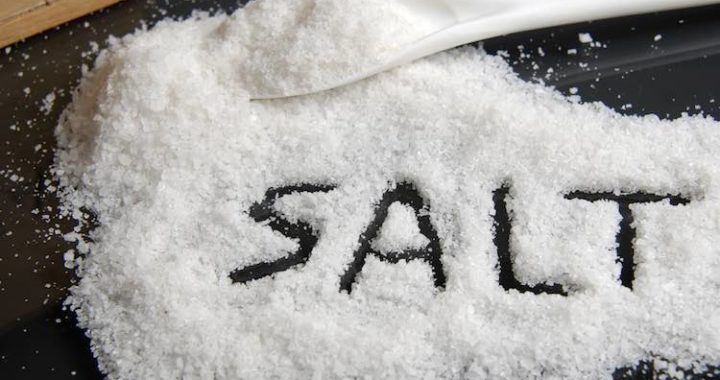Every Sabbath Eve (Friday evening) there are many traditions that we practice in Judaism related to the Sabbath. One of those traditions involves bread and salt. On the Sabbath we always have at least two special braided breads called “חלות” – “challot,” which means “breads” or “cakes” (Lev. 2:4), and in the singular form, “חלה” – “challah.”
There are always at least two challot on the Sabbath table to remind us of the provision of God to provide a double portion for His people on the Sabbath. This practice comes from the biblical account in the book of Exodus when the children of Israel were in the desert and they collected a double portion of Manna on Friday morning for both Friday and Saturday (Ex. 16:22-30). The two challot of the Sabbath table remind us of the faithfulness of God and the provision of food during the weekly day of rest.
There is meaning in everything in Judaism, as illustrated in the special bread of the Sabbath. Another tradition that is practiced in connection to the bread of the Sabbath is sprinkling the challah bread with salt before blessing it. The bread is sprinkled with a generous portion of salt and then blessed and shared by all who are sitting at the table. From where does the tradition come of salting the bread?

Leviticus
The answer to the above question is found in this week’s Torah Portion. This week’s Torah Portion is called “ויקרא” – “vayikra,” which means “and He called.” As is often the case, the weekly Torah Portion is named after the first word in Hebrew of the given text, “Then the LORD called to Moses and spoke to him from the tent of meeting, saying, …” (Lev. 1:1).
This week’s reading is found in the first five chapters of Leviticus together with the first few verses of chapter six. In these chapters and verses of Leviticus we have detailed instructions from God to Moses and Aaron regarding the various sacrifices and offerings that the children of Israel were to bring to the LORD and how the priests were to properly execute these sacrifices and offerings. For a more in-depth study of the various sacrifices, I recommend the following article: Sacrifice
The Command of Salt
In the middle of these many details regarding offerings found in Leviticus, we find the source of the answer to the question I asked above regarding the origin for the tradition of salting bread. We read the following in Leviticus chapter two:
Every grain offering of yours, moreover, you shall season with salt, so that the salt of the covenant of your God shall not be lacking from your grain offering; with all your offerings you shall offer salt. – Lev. 2:13
In this one verse we have the foundational roots of why we always add salt to our challah bread on the Sabbath.
The Sabbath Table
The Sabbath table is understood as an extension of the Tabernacle service. Many of the requirements of the priests in the Tabernacle (and later the Temple) are carried over to the home, especially on the Sabbath. For example the Jewish tradition of washing one’s hands before eating bread comes from the biblical commandment for the priests to wash their hands and feet before carrying out their duties (Ex. 30:17-21). In a similar manner, bread is understood as the representation of grain offerings and just as the priests were commanded to add salt to all grain offerings, salt is added to the challah bread of the Sabbath table.
The command given about adding salt to grain offerings is actually not limited to grain offerings. As it says at the end of the verse quoted above, “with all your offerings you shall offer salt.” The biblical command of adding salt to all offerings is given without much explanation. The only stated reason for adding salt to offerings in the verse above is in connection to a covenant with God: “…so that the salt of the covenant of your God shall not be lacking from your grain offering;”
The phrase “shall not be lacking” in Hebrew is “ולא תשבית” – “ve’lo tash’beet” and is literally translated, “shall not cease.” The section of the verse quoted above is best translated as “so that the salt of the covenant of your God shall not cease from your grain offerings.” The adding of salt to offerings was meant to be a perpetual act which was tied to a covenant of God. Why did God make the act of adding salt to offerings a perpetual ordinance? What is significant about salt and how is it connected to offerings and to the priesthood?

In the book of Numbers we read about the covenant of salt related to the priests and offerings in a similar manner as we read in Leviticus chapter two. In the context of how the offerings were to be given to the priests as gifts, we read the following verse:
All the offerings of the holy gifts, which the sons of Israel offer to the LORD, I have given to you and your sons and your daughters with you, as a perpetual allotment. It is an everlasting covenant of salt before the LORD to you and your descendants with you. – Num. 18:19
Once again we read how salt is connected to the everlasting covenant between the LORD and the priests regarding the offerings that were brought to the Tabernacle. The phrase “perpetual allotment” in the above verse comes from the Hebrew phrase “לחק עולם” – “lehok olam” and literally means “as an everlasting ordinance.”
Combining what we read in Leviticus 2:13 and Numbers 18:19 we can conclude that the adding of salt to offerings was to be a perpetual act and that it was bound by an everlasting covenant of salt between the LORD and the priests. It is also clear that the priests were to have the right to eat of certain offerings as an everlasting ordinance that was also bond by this everlasting covenant of salt. What is the significance of the everlasting covenant of salt?
The Everlasting Covenant of Salt
In my research regarding the “everlasting covenant of salt,” I came across the following rabbinic interpretation of Numbers 18:19 in a commentary:
Verse 19 states that the priestly function would last forever. It is a “covenant of salt”; just as salt is incorruptible, so too are the priestly duties and the gifts the priests are required to receive. – Drazin, Israel & Wagner, Stanley M. Onkelos on the Torah. Gefen Publishing, Jerusalem. 2011. p. 165
According to this commentary, salt represents something that is incorruptible and therefore eternal, everlasting. This perspective seems to fit perfectly with the two verses in focus which speak of the duties and benefits of the priesthood being an everlasting ordinance.
The priesthood was not a position to be sought after or applied for, but rather, it was only commissioned by God. Aaron and his sons were appointed by God to serve the LORD as priests and this came with great responsibility:
So the LORD said to Aaron, “You and your sons and your father’s household with you shall bear the guilt in connection with the sanctuary, and you and your sons with you shall bear the guilt in connection with your priesthood…” – Num. 18:1
Aaron and his sons were forever bond to the priesthood and they were to bear the guilt of all that was connected to the Tabernacle and the priesthood. The priesthood was not simply a profession but an appointment from God as intermediaries between God and man that was forever bond by an everlasting covenant of salt.

The Covenant of Salt and the Kingdom
We read about this covenant of salt in one other place in the Bible. In the days when the nation of Israel was divided and at war with one another, King Abijah of Judah spoke these words to King Jereboam of Israel and to all the people who identified with the northern kingdom of Israel: “Do you not know that the LORD God of Israel gave the rule over Israel forever to David and his sons by a covenant of salt?” (2 Chronicles 13:5) The phrase “covenant of salt” in Hebrew is “ברית מלח” – “brit melach,” which is consistent with Leviticus 2:13 and Numbers 18:19.
King Abijah was stating a known fact that the God of Israel had made an eternal covenant with the house and line of David regarding the kingdom of Israel. It was an everlasting covenant that was firmly established by a covenant of salt. The covenant of salt which is spoken of in these three different places in the Bible is consistently an everlasting covenant established by God in relation to His people. The kingdom and the priesthood of Israel were firmly established by a covenant of salt.
Where is the Priesthood Today?
The priesthood was established by God with an eternal covenant of salt, as we have read in the Scriptures above. If this is so, where is the priesthood today? The priesthood of Aaron and his descendants ended approximately 2000 years ago when the Second Temple was destroyed.
A Change in the Priesthood
It is only in the New Testament that we have a clear explanation of what has happened to the priesthood and how God’s eternal covenant of salt continues through His appointed priest:
Therefore, since we have a great high priest who has passed through the heavens, Yeshua the Son of God, let us hold fast our confession. For we do not have a high priest who cannot sympathize with our weaknesses, but One who has been tempted in all things as we are, yet without sin. – Hebrews 4:14-15
Throughout the book of Hebrews we read about the appointment of the Son of God to redeem humankind from sin through the sacrifice of Himself. Through His sacrifice He has been made a great high priest forever.
The New Nature of the Priesthood
Yeshua was not from the line of Aaron nor did He serve in the Temple as an ordinary priest. Rather, Yeshua came according to the priesthood of Melchizedek in order to fulfill the everlasting covenant of the priesthood through a new way and a new covenant:
Now if perfection was through the Levitical priesthood (for on the basis of it the people received the Law), what further need was there for another priest to arise according to the order of Melchizedek, and not be designated according to the order of Aaron? For when the priesthood is changed, of necessity there takes place a change of law also. For the one concerning whom these things are spoken belongs to another tribe, from which no one has officiated at the altar. For it is evident that our Lord was descended from Judah, a tribe with reference to which Moses spoke nothing concerning priests. And this is clearer still, if another priest arises according to the likeness of Melchizedek, who has become such not on the basis of a law of physical requirement, but according to the power of an indestructible life. For it is attested of Him, “You are a priest forever according to the order of Melchizedek.” – Hebrews 7:11-17
Aaron and his sons were limited in their priesthood through their earthly existence, however Yeshua, being the Son of God, serves as a high priest forever.
The Everlasting Priest and King
We learn from this everlasting covenant of salt that God is able to fulfill His Word without fail and to do so in a manner that seems almost unimaginable. God fulfilled this everlasting covenant of salt in both the priesthood and in the royal line of David through one person, Yeshua the Messiah. Yeshua, through His sacrifice and resurrection, has gained the right to forever serve as Priest and King!
Shabbat Shalom – We welcome your comments below!
If you enjoyed reading this article, share it today with friends! We also invite you to sign up for our weekly Torah Portion commentary on the sidebar to the right.
Help keep our weekly commentaries free and available to all. Click here to donate today:
Torah Portion: Lev. 1:1 – Lev. 6:7 (Hebrew – 5:26)
Haftara: Isaiah 43:21 – Isaiah 44:23
Return to Torah Portion Homepage
Copyright Jewels of Judaism. All rights reserved 2017



As you have noted Daniel, salt is incorruptible, yet Yeshua referred to salt losing its flavour so it would be thrown out. This bothered me for a long time. Then on a trip past the salt cliffs of the Jordan Valley we were taught that the salt on tables at that time came from the salt cliffs and mines straight to the table without refining. One had to pick out the crystals of salt from the bowl of ‘salt’ and when all the salt had been removed, what was left were bits of grit with no flavour, not salt at all, which were then thrown away. That made so much sense of it!
JESUS I LOVE
Indeed, God has done an amazing thing and a perfect work in Christ. I believe the passage in 1 Peter 2:9 speaks of the priesthood of all believers. Unfortunately, there are many Christians who do not believe it. Our responsibility is to make intercession for the people to God and be the salt of the earth,
Good application Rosa!
Jeshua Saïd to his follows : Ye are the salt of the earth: but if the salt have lost his savour, wherewith shall it be salted? it is thenceforth good for nothing, but to be cast out, and to be trodden under foot of men. Matt5:13
But ye are a chosen generation, a royal priesthood, an holy nation, a peculiar people; that ye should shew forth the praises of him who hath called you out of darkness into his marvellous light: 1peter2:9
Our lives should be holy offerings to God.